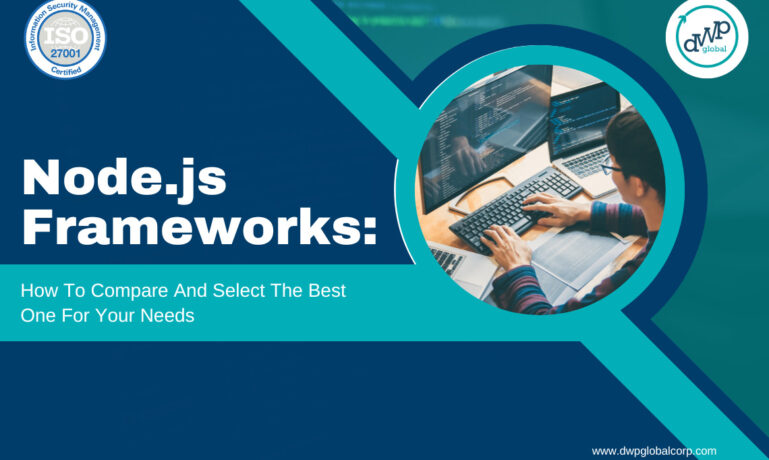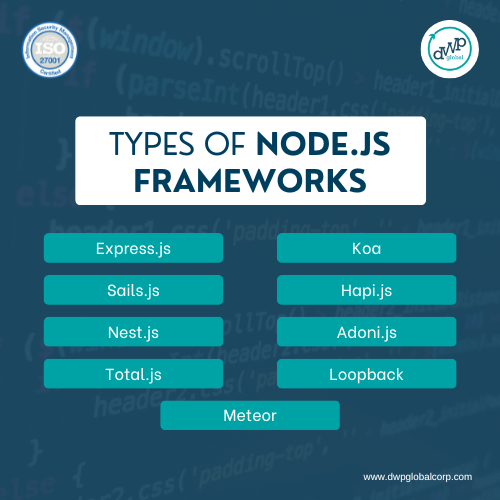- By: Admin
- November 24, 2023
- 1620 views

Node.js is an open-source framework, cross-platform JavaScript runtime environment that helps developers implement server-side code using JavaScript. Node.js allows developers to build web applications and server-side programs using JavaScript that is linked with client-side scripting in web browsers. Node.js is commonly used for building web servers and back-end services, which makes it a renowned choice for building real-time web applications, APIs, and microservices, making it easy for developers and reducing development costs.
This article will dive deep into types of Node frameworks, JavaScript frameworks, and Rest API frameworks and choose the right one based on your requirements.
What Is A Node.js Framework?
Node.js framework typically refers to a web application framework designed for Node.js. These frameworks are important for building web applications, managing databases, handling routing, and dealing with HTTP requests. Node.js, with its event-driven architecture and cross-platform compatibility, provides a powerful platform for object-oriented programming, allowing developers to create highly modular and scalable applications that can run seamlessly on different operating systems. Examples of these Node.js frameworks are Koa, Hapi.js, Express.js, Sails.js, and many more. They make it easy for web app development in Node.js by providing tools and conventions.
Types Of Node.js frameworks
Node.js frameworks are a set of pre-build tools, libraries, and structures that ease the process of building APIs and web apps using Node.js. These frameworks offer a structured way to build server-side applications, ease out handle routing, handle requests, manage databases, manage crud requests, and execute other server-side tasks. Some of the commonly used and popular frameworks include:
- Express.js: Express.js is a widely used web application framework for Node.js. It offers a simple and flexible way to build web APIs and applications. Many Node.js frameworks and other libraries are built on top of it to integrate with Express.
- Koa: Koa is the latest, lightweight, and flexible framework compared to Express.js. It is designed to express and make maximum out of JavaScript’s functionality. Koa can opt for applications that require control over the middleware and request-handling process.
- Sails.js: Sails.js is a Model-View-Controller (MVC) framework designed to ease real-time web applications and deliver dynamic content. It comes with features like WebSocket, data-drives APIs, and a scalable architecture.
- Hapi.js: Hapi.js is a powerful and flexible Node.js framework for building services and applications. It is popular for its configuration-driven approach and the ability to build restful APIs and handle complex routing.
- NestJS: NestJS is a full-featured and highly extensible framework for building maintainable server-side applications. It leverages decorators and TypeScript to provide a structure similar to Angular on the server side, making it an apt choice for building enterprise-level applications.
- Adoni.js: Adoni.js is one of the MVC frameworks used for building web services applications with Node.js. It provides a simple and clear structure for application development, including robust object-relational mapping (ORM), and emphasizes developer productivity.
- Total.js: Total.js is a framework that provides a simple and modular approach to APIs, web applications, and other real-time applications. It is a full-stack solution, offering a wide range of features for both client and server-side applications.
- Loopback: Loopback is an extensible framework for creating API services. It is renowned for its strong focus on building data-driven APIs and offers built-in support for connecting to various data sources.
- Meteor: Meteor is a full-stack JavaScript platform that includes its framework for creating mobile apps and for web development. It offers real-time data synchronization between the client and server sides to build collaborative and real-time applications.
These frameworks help streamline the development process, maintain code configuration and consistency, and boost code reusability. The choice of framework depends on the specific requirements of your project, as well as your personal preferences and development style. Each framework has its strengths and may be better suited for certain types of applications or development scenarios.
All these frameworks allow designers to make arrangements, and developers help with the reusability of codes easily in a Web Application Development Company.

What is a JS framework?
JavaScript is a functional programming language. A “JavaScript framework” is a term that can refer to different types of frameworks and libraries used for developing complex web applications and other software development and scalable server-side applications using the JavaScript programming language. The specific type of JavaScript framework you’re referring to can vary based on the context and use case. Let us discuss some common categories of JavaScript frameworks using Node.js that can help JavaScript developers.
- Angular: Angular is one of the front-end JavaScript frameworks developed and maintained by Google. Angular is a comprehensive front-end framework for creating dynamic web applications. It provides tools from routing to data management.
- Sapper: Sapper is a framework for building server-rendered web applications with Svelte, a front-end JavaScript framework. It can be combined with Node.js to handle the server-side rendering.
- React: React is a front-end JavaScript library for building user interfaces. While it’s primarily used for client-side development, it can also be used in conjunction with Node.js to build full-stack applications, especially when combined with server-side rendering frameworks like Next.js or Gatsby.
- Vue.js: Vue.js is a progressive frontend framework for building user interfaces. It can be used with Node.js in a similar way as React and Angular to create full-stack applications.
- Feathers.js: Feathers.js is a real-time application framework for Node.js. It simplifies building RESTful APIs and real-time applications and is often used with various frontend frameworks.
There are several JavaScript frameworks for frontend and backend development. The choice of a JavaScript framework depends on the type of application you’re building and your specific requirements. Different frameworks excel in various areas, and the right choice will depend on important factors such as project complexity, development team expertise, and software development goals.
JavaScript frameworks are the most preferred platforms for developers in a Software development Company as they offer excellent features and functions to build software.
Rest API frameworks
REST API frameworks are tools and libraries that help developers create, maintain, and manage Representational State Transfer (REST) APIs in an efficient and organized manner. Let us discuss some popular REST API frameworks using Node.js:
- Express.js: Express.js is an extensively used framework for creating restful APIs with Node.js. It is simple and flexible, making it suitable for a wide range of projects. Many Node.js developers choose Express for its simplicity and extensibility.
- Feathers: Feathers is a minimalist, highly extensible, and lightweight framework for creating and managing Restful APIs.
- Restify: Restify is a Node.js framework designed particularly for building Rest services. It focuses on providing required features for API development, such as request handling, request routing, and response formatting.
These Node.js frameworks provide various features and capabilities to streamline the process of building RESTful APIs. Your choice of framework will depend on your project requirements, familiarity with the framework, and your development style.
Even a Top Mobile App Development Company uses the Rest API frameworks for their applications for better security features and development tools provided by these frameworks.
Conclusion
Node.js framework is a versatile platform for web application development. We have explored HTTP server frameworks, full stack MVC frameworks, Restful API frameworks, and JavaScript frameworks, all of which enhance data processing, development speed, and developer productivity. These frameworks boost the data processing and development speed of web applications, software development, and mobile applications, increasing developer productivity and facilitating active codebase development. Choosing the right framework is essential for productivity and efficient application development.

